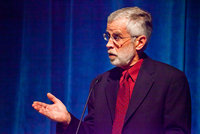Perry says gay marriage is a human right
By Mary Loftus | Emory Law | Apr 6, 2012 12:04:00 AM

Catholic bishops have been in the news lately saying that the federal mandate that private insurers cover contraceptive services violates religious freedom.
But the Catholic Church also supports policies that compromise the religious and moral freedom of others, namely the non-recognition of gay marriages, says Robert W. Woodruff Professor of Law Michael J. Perry, a senior fellow at Emory’s Center for the Study of Law and Religion, in a recent lecture on “Freedom of Religion, Same-Sex Marriage, and the Catholic Church.”
“Because the desire to live together with another person in a legally recognized marriage is, for most persons, animated at least in part by one’s most fundamental convictions and commitments, and because the ‘non-recognition policy’ prevents a same-sex couple from living together in such a marriage, the policy implicates the right to religious freedom,” Perry says.
It is of course the right of the Catholic Church to define marriage for its members in any way it sees fit, he adds, but “here we’re talking about access to civic marriage.”
The International Covenant on Civil and Political Rights, signed and ratified by the U.N. General Assembly and most of the countries in the world, including the United States, forbids governments from banning or otherwise impeding practices such as same-sex marriage unless three conditions are satisfied, says Perry.
First, the ban must serve a legitimate government interest. Second, it must be the “least burdensome” way to serve that interest. Third, the ban’s advantages to society must be proportionate to its disadvantages to those it impacts.
Perry shows that the ban on same-sex marriage does not meet the legitimacy criteria by examining the “government interests” that supporters of the non-recognition policy have claimed.
For example, claims based on morality—including that same-sex sexual conduct is contrary to the will of God, or that sex not leading to procreation is hostile to one’s moral health—contradict the right to religious and moral freedom, since governments would be answering religious questions in a non-pluralistic manner.
Perry also explored claims based on non-religious premises, including one that argues the non-recognition policy protects the welfare of children and the institution of traditional marriage.
"There is no credible support for these claims,” Perry says. “There is no evidence that any country or state that has so far granted access to civil marriage for same-sex couples has imperiled either the institution of marriage or the welfare of children.”
Indeed, denying access to marriage for same-sex couples imperils the welfare of “those many children who are now being raised by same-sex couples,” he adds.
Such a ban is more likely to corrode than to nurture the strength of any democracy that is religiously and morally pluralistic, Perry says, if one is to take the right of religious and moral freedom seriously.
“And the bishops, as well as everyone else, should want that right to be taken seriously,” he concludes.

